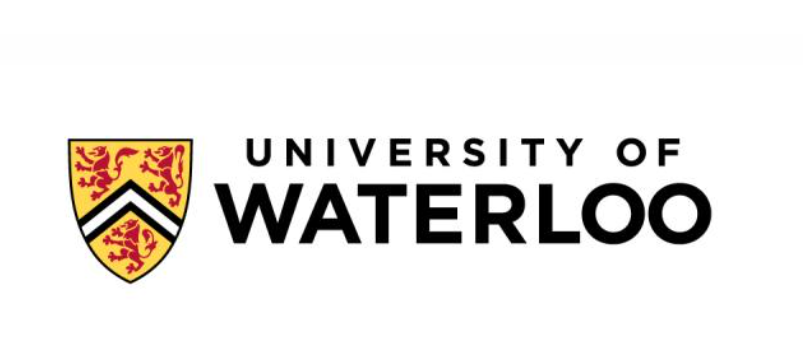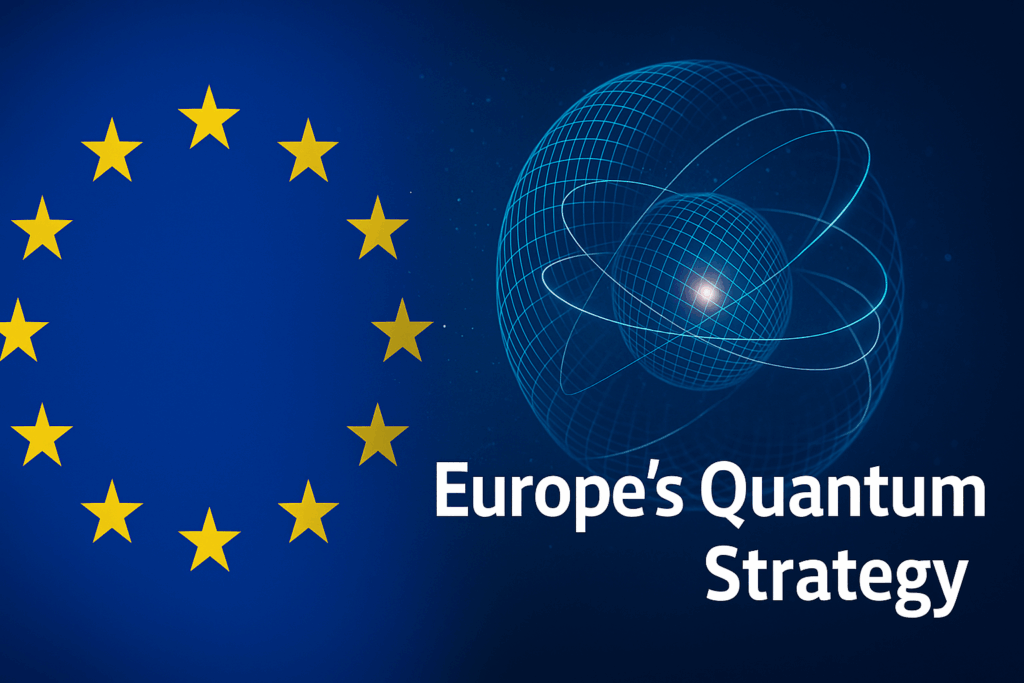Insider Brief
- The University of Waterloo’s Transformative Quantum Technologies (TQT) program, part of the Institute for Quantum Computing (IQC), focuses on accelerating quantum device development and usage.
- The TQT annual Quantum Opportunities and Showcase highlighted potential quantum technology applications in environmental and health sciences, featuring panels, presentations, and tours of advanced research labs.
- Discussions included quantum computing’s role in environmental monitoring and challenges in adapting quantum sensors for real-world applications.
PRESS RELEASE — University of Waterloo/December 15, 2023 — Practical and scalable quantum computers are still in the early stages of development, and many technical challenges need to be overcome before they can be widely used for various applications. Researchers and companies globally, as well as right here at the University of Waterloo, are diligently pushing the boundaries of quantum computing technology, driving forward innovations in this emerging field.
The Transformative Quantum Technologies (TQT) program hosted its annual Quantum Opportunities and Showcase on December 14, at the Research Advancement Centre 2 (RAC2).
TQT is a collaborative research initiative supported by the Institute for Quantum Computing (IQC) at Waterloo. It aims to accelerate the development and use of impactful quantum devices. The University is not only dedicated to ground-breaking research but has spun out more than 15 quantum startups. This combination of world-leading facilities, researchers, and innovations is why Waterloo is referred to as Canada’s quantum valley.

The showcase delivered a deep dive into the world of quantum technologies and their potential applications in the fields of environmental and health sciences. The event allowed for researchers, students and industry to come together and discuss ways to advance the field and provide examples of the capabilities of quantum computing. The day included insightful panels, presentations and a tour of the state-of-the-art research labs at the IQC and TQT.
Environment panel
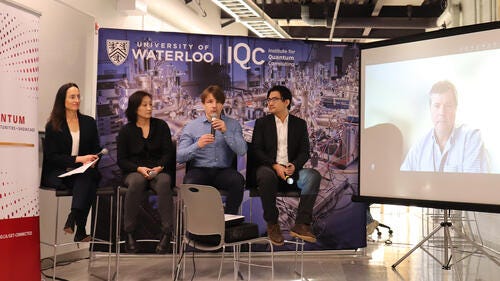
Left to right: Tracey Forrest, program director, TQT, Shirley Tang, associate dean, research, Faculty of Science, Alexandre Cooper-Roy, research associate and senior technical lead, Quantum Simulation and Transformative Quantum Technologies, Weinan Zhao, postdoctoral fellow, Neil Rowlands, engineering fellow, Honeywell Aerospace
Kicking things off in a panel discussion on quantum in the environment, experts discussed where quantum could help in the future when it comes to measuring, monitoring and mitigating the environmental impacts of human activity on the atmosphere, our oceans and in our terrestrial ecosystems.
All this environmental monitoring, data collection and processing takes immense computing power. Quantum computers have the potential to solve certain problems much faster than traditional computers. They are particularly well-suited for tasks such as factoring large numbers, searching large databases and simulating systems, which are challenging for traditional computers to handle efficiently.
“In addressing the vast challenges of monitoring water, air and soil impacted, the current system of sequential sampling is economically impractical due to the extensiveness and remoteness of areas involved,” said Dr. Shirley Tang, associate dean of research in the Faculty of Science. “To overcome this, quantum technology may offer a promising solution by enabling simultaneous monitoring of multiple sites using remote sensor technology, revolutionizing our approach to understanding environmental changes.”
The panel also discussed how using quantum computing for environmental assessment raises challenges as quantum sensors may work well in a lab environment, but do not fare well in rugged terrain.
“I encourage reaching out to potential beneficiaries of quantum technology, understanding their specific needs and adoption criteria,” Alexandre Cooper-Roy said, a research associate and senior technical lead for Quantum Simulation and Transformative Quantum Technologies. “Mining companies, operating in noisy and dirty environments, they have a very different operation criteria than what happens in the lab. So, it’s very important to engage at the earlier stage.”
Health panel
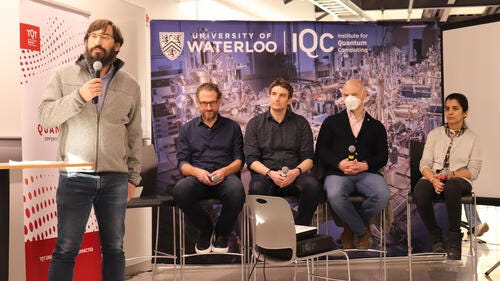
Left to right: Dmitry Pushin, professor, Department of Physics and Astronomy, Michael Reimer, professor, Department of Electrical and Computer Engineering, Troy Borneman, senior scientist, High Q Technologies, Michal Bajcsy, professor, Department of Electrical and Computer Engineering, Subha Kalyaanamoorthy, professor, Department of Chemistry
The health panel explored ways that quantum technologies could be used in a range of applications from medical imaging to drug discovery and the development of personalized medicine.
A recurring theme was how quantum scientists need to regularly consult with end users of quantum devices from technicians to clinicians.
“Our quantum device, designed for high sensitivity, became more impactful when we identified real-world problems through conversations with those who could guide us in integrating it into their workflows,” Troy Borneman said, a senior scientist at a quantum startup called High Q Technologies. “This approach proved effective in making a meaningful impact, especially in addressing economic and time efficiency concerns in large biological or health problems.”
“In our case at High Q Technologies, we recognized a significant challenge in biology related to understanding protein folding and structural biology. This led us to design a system with high sensitivity for electron paramagnetic resonance, a crucial aspect for pharmaceutical companies and their drug development techniques,” Borneman said.
After the panel discussions, the potential of quantum applications came to life through insightful posters and guided tours of the quantum labs at the Research and Advancement Centre (RAC2). Waterloo’s students and researchers presented how they use the cutting-edge equipment to develop their innovative projects and discussed possible commercialization avenues, establishing foundations for tangible impact.
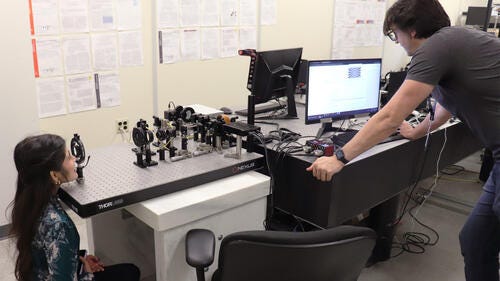
Right: Graduate student Connor Kapahi demonstrates quantum opportunities in optometry
This showcase highlights Waterloo’s leadership in advancing quantum computing, a developing scientific field, to generate new technologies for positive human progress in the realms of environmental and health sciences.
“The TQT program has demonstrated agility in addressing needs and providing ongoing support for ambitious research-to-application activities, as discussed today,” said Tracey Forrest, program director, Transformative Quantum Technologies. “Since its launch in 2016, TQT has assisted more than 600 researchers, including students, postdocs and nearly 50 faculty members at the University of Waterloo.”
For more market insights, check out our latest quantum computing news here.

